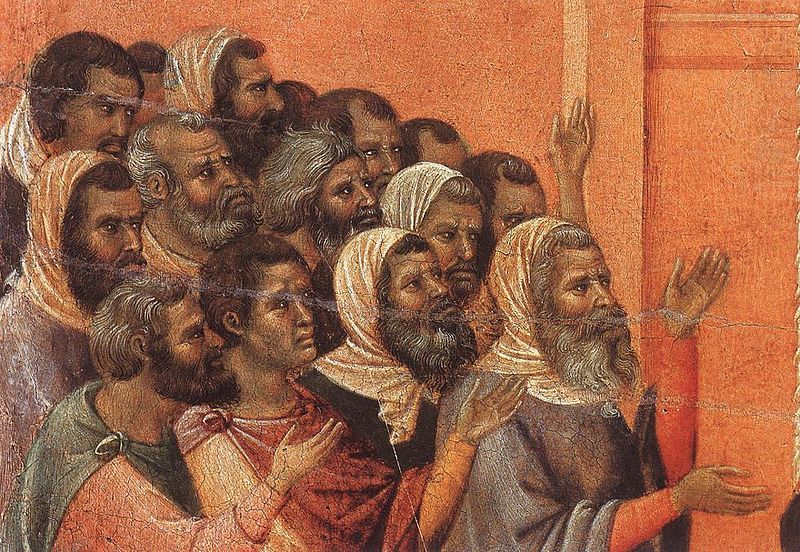Today’s Gospel, like many in the past few days, gives us Jesus in confrontation with the religious elites of Jerusalem.
The story comes from the 23rd chapter of Matthew. It’s short. Here it is in full:
Jesus said:
Woe to you, scribes and Pharisees, you hypocrites.
You pay tithes of mint and dill and cumin,
and have neglected the weightier things of the law:
judgment and mercy and fidelity.
But these you should have done, without neglecting the others.
Blind guides, who strain out the gnat and swallow the camel!Woe to you, scribes and Pharisees, you hypocrites.
You cleanse the outside of cup and dish,
but inside they are full of plunder and self-indulgence.
Blind Pharisee, cleanse first the inside of the cup,
so that the outside also may be clean.
In case you missed it, this is the Gospel in which Jesus tells a joke. “Blind guides, who strain out the gnat and swallow the camel.” The gnat was supposed to be the tiniest creature in Judea, and the camel the largest. Both are not kosher — ritually impure. The scribes and the pharisees took great care to avoid contact with gnats, which (as anyone who has been there can tell you) are everywhere in the Holy Land and collect around putrid food and smelly animals. Some pharisees went so far as to strain their cups of wine through a handkerchief so as to be absolutely certain that no gnats has fallen in. Little specks on a handkerchief mesmerized and obsessed them, while gross injustice swirled all around. So when the Lord delivered his zinger, there were certainly groans as well as chuckles in the crowd.
Those chuckles were aimed at the pharisees and the scribes, the power-brokers of Jesus’s day. But it is not enough to laugh at the peccadilloes of others. Because when Jesus says, “blind pharisee!” or “hypocrite!” he is talking to me. He is talking to you.
A hypocrite — in Greek, ὑποκριτής (hypokritēs) — originally meant an actor: someone who swans around the stage, hungry for applause. The religious elites of Jesus’s time played to the balcony with their elaborate observances. They gave people headaches with their mathematical precision in collecting the tithe. In ancient days, God asked the people to pay a tithe of the first-fruits as a sign of gratitude to the Lord of the harvest (see Deuteronomy 14:22). But here we have the Temple officials counting out springs of mint, dill, and cumin with tweezers. Where, Jesus asks, are justice, mercy and fidelity? He makes it all look ridiculous. And we laugh. Because we do the same.
When we laugh, our inhibitions fall away and our heart breaks open. We crack a smile and then open our mouths wide and guffaw. That is when the Lord darts in.
And when He comes in, He enlarges our hearts. We see our pettiness and our pride, and instead of being embarrassed and defensive we just laugh. Relief and release open us to love. And that is the reason for Jesus’s joke. By laughing, we learn to be generous. We learn to forgive, and to forgive ourselves. We become honest, no longer pretending, and that sets us free. We learn to love. And we become vessels of God’s love.
Love — real, divine love — is generous. It is expressed in sacrifice; it costs. It never clicks its tongue at the weak. It bends down in humility to embrace and to bear the burdens of those who are suffering. And it transforms us from miserable bean-counters into saints.
Laugh today. Laugh at your pretentions and your smallness and your pettifogging obsessions. Look at your sins as God does, like so many tiny black specks in a wine-stained handkerchief. And maybe, in that moment of unguarded mirth, you will learn — again — to love.
Laughter echoes in worlds radically different than our own. For dessert, take in this work by Hafez, a 14th-century mystic born in Shiraz, in what is now Iran:
Tripping Over Joy
What is the difference
Between your experience of Existence
And that of a saint?The saint knows
That the spiritual path
Is a sublime chess game with GodAnd that the Beloved
Has just made such a Fantastic MoveThat the saint is now continually
Tripping over Joy
And bursting out in Laughter
And saying, “I Surrender!”Whereas, my dear,
I am afraid you still think
You have a thousand serious moves.



